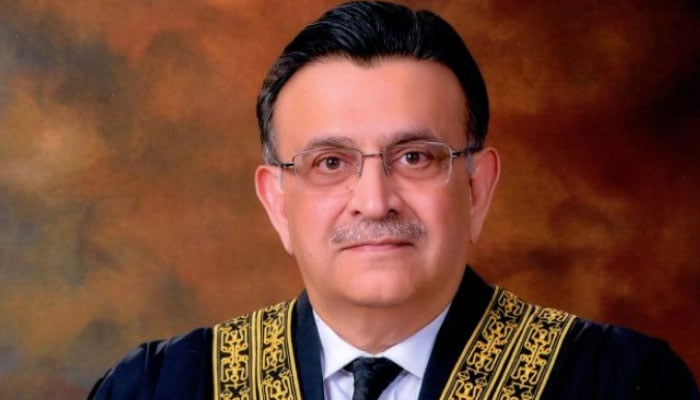Political leaders should refrain from dragging judges into politics: CJP
CJP Bandial's comments came after PM Imran Khan claimed that Nawaz Sharif was trying to woo Supreme Court judges
ISLAMABAD: Chief Justice of Pakistan (CJP) Umar Ata Bandial on Monday asked the political leaders to refrain from dragging the judges into politics.
He made the remarks during the hearing of a presidential reference seeking the Supreme Court's opinion on Article 63-A of the Constitution and a petition of the Supreme Court Bar Association (SCBA) on political rallies in Islamabad.
A five-member bench, comprising Justice Umar Ata Bandial, Justice Ijazul Ahsan, Justice Mazhar Alam Khan Miankhel, Justice Munib Akhtar and Justice Jamal Khan Mandokhail is hearing the cases.
At the outset of today’s hearing, CJP Umar Ata Bandial said that they cannot stop political parties from issuing political statements but they should not try to influence the court through their statements.
At this, Justice Jamal Khan Mandokhail asked that should the prime minister have not avoided issuing irresponsible statements?
On Saturday, PM Imran Khan, while addressing a public gathering in Kamalia had said that PML-N supremo Nawaz Sharif was trying to woo judges against his government.
Justice Mazhar Alam Khan Miankhel said that the prime minister gave a reference to their questions in his speech.
Expressing his annoyance, the judge said what impression is being given of their queries? He asked that should such political statements be given.
“PM Imran Khan in Kamalia said Supreme Court judges are being wooed,” the judge remarked.
At this, the attorney general asked the judge that the judiciary should avoid whatever is happening outside the court. The SC judge said that the speech was aired on national TV and everyone heard it.
“PM should avoid giving such statements,” Justice Jamal Khan Mandokhel said.
Meanwhile, Justice Umar Ata Bandial said that social media and media should avoid such words and directed the attorney general to start his arguments on the case. He remarked that they are not affected by what is said outside the court.
“Does the prime minister not trust the Supreme Court?” asked Justice Jamal Khan Mandokhail.
Will it not be a musical chair if those lawmakers who cross the floor again come to the assemblies after winning the elections, intervened Justice Ijazul Ahsan. He maintained that it is like a joke with the system.
“Let the voters decide if someone usurp their rights,” remarked Justice Mandokhail.
He asked that will resignation not be enough for a lawmaker after defying the party policy.
At this, the attorney general said that the defiant lawmakers are reluctant to tender resignation. Justice Mandokhail observed that it seems the presidential reference is brought for certain people.
Meanwhile, the CJP said that Article 63-A of the constitution talks about two consequences for the defiant lawmakers. The defiant lawmaker is de-seated and his seat is considered vacant.
Directing the attorney general to wind up his arguments in one hour tomorrow, the CJP adjourned the hearing of the reference till tomorrow. The court will resume the hearing at 1 pm on Tuesday.
The reference
On March 21, the government submitted a presidential reference before the Supreme Court seeking the interpretation of Article 63-A of the Constitution.
Here are key highlights from the reference:
- The document calls defections from a political party a “morally reprehensible and destructive act which shakes the confidence of the public in the democratic process.”
- It presents the Court with two interpretations of Article 63(A):
- That the defected lawmaker be only de-seated, with no further restriction or curbs from seeking election.
- Such members are disqualified for life under Article 62(1)(f) and “will never be able to pollute democratic streams,” the reference adds.
- The ruling party argues that the second option will be a “robust and purpose-oriented interpretation of Articles 62 and 63(A)” which “would advance a highly desirable constitutional goal by shutting the doors of parliament for habitual turncoats.”
- The reference also asks the Court if the vote of a member, who engages in the “constitutionally prohibited and morally reprehensible act of defection” should be counted?
- The reference further inquires from the Court what other steps can be undertaken, within the existing constitutional and legal framework to curb, to “deter and eradicate the cancerous practice of defection, floor crossing and vote-buying?”
-
Security forces gun down 30 terrorists in multiple IBOs in KP: ISPR
-
MQM-P calls for new province in Sindh
-
US report validates Pakistan military edge over India: PM
-
Banned TTP poses serious threat to Pakistan security: UNSC panel
-
CM Afridi clarifies remarks on by-poll after ECP requests army deployment
-
Dubai sees 3.2m Pakistani passengers in 2025 as airport sets new milestone
-
Security forces kill 23 Indian proxy terrorists in KP's Kurram
-
Pakistan to construct island to boost oil exploration: report












